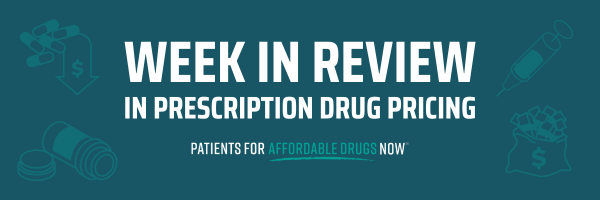
Let’s hear it for the underdog! If the Denver Nuggets can bring home their first NBA championship, patients can continue taking on Big Pharma to win lower drug prices for all patients. 🏀💊
Welcome to the Week in Review.
1. 🚨 New P4AD Cancer Drug Price Report 📰
- This week, P4AD released a new report that highlights the burden of cancer drug prices on patients and details the positive impact of the Inflation Reduction Act that will bring relief to people living with cancer. “Cancer patients — the majority of whom are on Medicare — can face annual out-of-pocket costs of more than $16,500,” said P4AD’s David Mitchell. In partnership with NORC at the University of Chicago, P4AD examined the impact of the $2,000 out-of-pocket cap, a provision in the drug price law that takes effect in 2025, and found that people with Medicare who get a brand-name cancer drug through Medicare Part D will save an average of $7,590 annually, with some saving as much as $19,296. This will make a huge difference for patients like Lynn Scarfuto, who takes oral chemotherapy drug Imbruvica to treat her leukemia. Imbruvica carries a monthly list price of over $17,000. “Thanks to the Inflation Reduction Act, cancer patients with traditional Medicare coverage will spend less on the prescription drugs they need,” said Dr. Danielle Carnival, Deputy Assistant to the President for the Cancer Moonshot program. “This report makes clear that as additional provisions get implemented – including the cap on annual out-of-pocket costs for prescription drugs – the President’s Investing in America agenda will give Americans with cancer much needed breathing room and peace of mind.” — (P4AD, The White House)
2. More Momentum For The Inflation Reduction Act
- The Biden Administration and Members of Congress are taking steps to further extend the Inflation Reduction Act’s drug price reforms to lower prices for more patients. Last week, the administration announced 43 drugs with prices rising faster than the rate of inflation that may be subject to penalties under the Inflation Reduction Act. That’s no small feat! This would save money for both patients and taxpayers. This week, the administration released new tools to increase enrollment in Medicare’s Extra Help Program, the subsidy that helps low-income people on Medicare pay for prescription drugs. Taking effect in January 2024, these new efforts come in addition to the expansion of the Extra Help program, which was included in the historic drug price law, and will make more people eligible for the subsidy. On Capitol Hill, Representatives Ruben Gallego and Elissa Slotkin introduced the Lower Drug Costs for Families Act, which would build on the drug price law by extending the inflationary rebate penalty to protect patients with private insurance. Bravo! Thank you to these lawmakers for fighting for further reforms to reign in high drug prices. — (HHS, HHS, Office of Rep. Ruben Gallego, The Gander)
3. Bipartisan Movement In Senate Finance To Crack Down on PBMs
- Senate Finance Committee Senators Wyden, Crapo, Menendez, Blackburn, Tester, and Marshall introduced bipartisan legislation this week: the Patients Before Middlemen Act would reform Pharmacy Benefit Managers’ (PBMs) practices by delinking the compensation to PBMs from the price of a drug. Democratic Chairman Ron Wyden explained that currently, PBMs often favor higher-priced drugs in their negotiations, which means “seniors are forced to pay more for their prescriptions.” Republican Ranking Member Mike Crapo laid out how the new bill would promote cost-savings for patients: “Delinking PBM compensation from sticker prices would take a critical first step in ensuring that all supply chain participants seek out the best deals available, driving down out-of-pocket spending and promoting cost-cutting competition.” This introduction proves that the committee is taking steps to deliver on its bipartisan legislative framework to address PBM tactics that drive up costs for patients and taxpayers. “It would be a real game changer,” P4AD’s David Mitchell tweeted. “No more would PBMs be paid based on the price of a drug in Medicare, but rather a service fee.” It’s exciting to see Senators from across the political spectrum aligned in this effort — let’s pass reforms to crack down on the middlemen’s secretive practices and advance reforms that protect patients! — (Senate Finance Committee)
BONUS WATCH: P4AD’s Merith Basey joined RJ Eskow on “The Zero Hour” to call out the bogus Merck lawsuit over Medicare negotiation and explain the impact of the drug price reforms in the Inflation Reduction Act. Check out the full interview here!
Have a great weekend!
